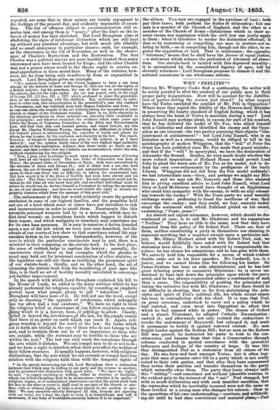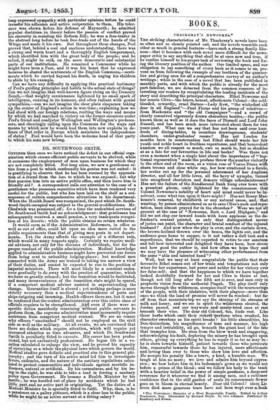WHY "PEELITES"?
Sworren Mr. Wingrove Cooke find a continuator, the writer will be sorely puzzled to allot the conduct of our public men to their
proper party designations. How will he account for the distribu- tion of parties during the session just closed P In what, respect have the Tories emulated the conduct of Mr. Pitt in Opposition ? Where have they copied the fidelity of the Heaven-born Minister in preserving the hearty standard of English feeling, which it has always been the boast of Tories to maintain during a war P lord John Russell may perhaps plead, in excuse for part of his conduct, that he has followed the model of Mr. Fox, who allied himself with a Catherine and almost identified the enemy and the Oppo- sition as one interest—the two parties pursuing their objects " con- jointement et solidairement" : but Lord John Russell, who is an historian as well as a statesman, would be obliged to tell in his autobiography of modern Whiggism, that the "will" of Peter the Great has been published since Mr. Fox made that grand mistake; and that if the " will " be apocryphal, we have the declaration of Alexander the Second. Besides, we very much doubt whether the more refined inspirations of Holland House would permit Lord John to plead the worst acts of Mr. Fox as his model, and to de- fend his own over-refinements by the proiligacies of the burly Liberal. Whiggism did not fall from the Fox model suddenly: we had intermediate men—Grey, and perhaps we might say Mel- bourne ; and we may ask Mr. Bonverie and those who assisted him in giving excellent advice to Lord John Russell what Lord Grey or Lord Melbourne would have thought of an Englishman who could hint sympathy with the enemy, or with an ally retreat- ing towards the enemy ? With the Peace party we need scarcely exchange words : professing to dread the costliness of war, they encourage the enemy ; and they could, we fear, scarcely under- stand the sentiment with which Falkland girded on his sword, exclaiming, "Peace, :peace !" An absurd and unjust misnomer, however, which should be die- continued at once, is to call Mr. Gladstone and his companions " Peelites." They have no title to the name, now that they have departed from the policy of Sir Robert Peel. There are four of them, neither constituting a party in themselves nor claiming to represent anything but a negative scruple upon a particular sub- ject. Mr. Sidney Herbert acted with Sir Robert Peel, and, we believe, would faithfully have acted with Sir Robert had that statesman been alive. He is much swayed by companionable im- pulses; he- has chosen his companions, and he has gone with them. We scarcely hold him responsible for a course of which evident doubts came out in his later speeches. Mr. Cardwell, too, is a junior, and we cannot blame him for following his leader. Sir James Graham has been an able administrator, and he has lent great debating power to successive Ministries : he is never un- derstood to hare laid down the principles upon which the party acted, and he has always represented rather a combination of men than a cause. The responsibility of positing the principles and taking the initiative lies with Mr. Gladstone; but there would be no difficulty in showing, that so hr from maintaining the prin- ciples and spirit of Peel's political life, his whole recent course has-been in contradiction with his chief. It is true that Peel, on great occasions, undertook to carry out a policy which he had resisted, and even went- into Opposition to effect that which he had opposed while in power. The chosen of Oxford and a stanch Protestant, he adopted Catholic Emancipation ; carried it; and afterwards not only resisted the endeavours to revoke the endowment of Afaynooth, but enlarged it, and made it permanent to fortify it against renewed contest. No man fought harder against the Reform Bill; but as soon as the Reform Bill was passed, he instructed his party to look to the con- stituencies, and became from that time a Conservative through reforms conducted in perfect accordance with the prevalent influences and feelings of the country at large. It was this that distinguished Peel as a statesman from all others of his day. He was born and bred amongst Tories; but it often hap- pens that men of promise enter life in a party which is not really suited to their own genius, and that after they have commenced they revise their position and transfer themselves to the party which naturally owns them. The party they leave always calls this "ratting"—and sometimes not without plausible reasons, in the evident gain to the interest of the "rat." Peel changed, but with so much deliberation and with such manifest sacrifices, that the reproaches which he inevitably incurred were not the same as those levelled at a young man who changes his colours. Slow in the operations of his own understanding,—cautious, and withhold- ing act until he had clear convictions and matured plans,—Peel long expressed sympathy with particular opinions before he could transfer his adhesion and active cooperation to them. His toler- ance was shown before his defence of Maynooth; he admitted popular doctrines in theory before the passion of conflict proved his sincerity in resisting the Reform Bill; he was a free-trader in the abstract long before he took free-trade out of the hands of the Whigs and made it his own. But throughout these changes, Peel proved that, behind a cool and cautious understanding, there was a strong and warm heart and a thoroughly English temperament, which identified him with the great body of the people; and he relied, it might be said, on the more democratic and substantial parts of our institutions. He remained a Commoner while he might have been a Peer, and it was his boast that he expressed because he shared the sentiments of the English Commona,—senti- ments which he carried beyond his death, in urging his children to abide by his example.
Can we have any difficulty in applying this practical testimony of Peel's guiding principles and habits to the actual state of things? Can we not imagine that well-known figure rising on the Treasury Bench,—that weighty countenance lightened by no small spark of intelligence, cunning in its humour, and often radiant with genial sympathies,—can we not imagine the clear plain eloquence taking up the course of England's action in war-time; explaining how we had stood with our foreign relations, reciting the ways and means by which we had marched to victory on the former occasions under Peel' e friend and coadjutor Wellington and Wellington's predeces- sors, and cheeringly calling upon the Commons for the ways and means by which now be would lead them into new exploits in de- fence of that order in Europe which maintains the independence of states ? Peel would have been the welcome head of that party to which his sons now belong.



























 Previous page
Previous page